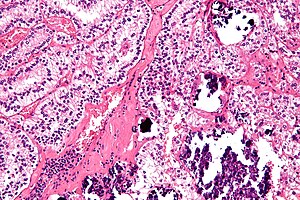Difference between revisions of "TFE3-rearranged renal cell carcinoma"
Jump to navigation
Jump to search
(→IHC) |
m (touch) |
||
| Line 3: | Line 3: | ||
| Image = Xp11.2_translocation_renal_cell_carcinoma_-_high_mag.jpg | | Image = Xp11.2_translocation_renal_cell_carcinoma_-_high_mag.jpg | ||
| Width = | | Width = | ||
| Caption = Xp11.2 translocation carcinoma. [[H&E stain]]. | | Caption = Xp11.2 translocation carcinoma. [[H&E stain]]. | ||
| Micro = large cells with clear or eosinophilic cytoplasm, calcification (classic histomorphologic feature), +/-papillae, +/-nests, +/-[[psammoma bodies]] (common), +/-[[hyaline bodies]] (common) | | Micro = large cells with clear or eosinophilic cytoplasm, calcification (classic histomorphologic feature), +/-papillae, +/-nests, +/-[[psammoma bodies]] (common), +/-[[hyaline bodies]] (common) | ||
| Subtypes = | | Subtypes = | ||
Revision as of 21:57, 27 October 2014
| TFE3-rearranged renal cell carcinoma | |
|---|---|
| Diagnosis in short | |
 Xp11.2 translocation carcinoma. H&E stain. | |
|
| |
| LM | large cells with clear or eosinophilic cytoplasm, calcification (classic histomorphologic feature), +/-papillae, +/-nests, +/-psammoma bodies (common), +/-hyaline bodies (common) |
| LM DDx | clear cell renal cell carcinoma, papillary renal cell carcinoma, epithelioid angiomyolipoma, clear cell papillary renal cell carcinoma |
| IHC | TFE3 +ve (nucleus), CD10 +ve, vimentin +ve, CK7 -ve (usu.) |
| Molecular | translocation involving TFE3, e.g. t(X;1)(p11.2;q21) |
| Site | kidney - see kidney tumours |
|
| |
| Prevalence | rare |
| Prognosis | poor |
| Clin. DDx | other kidney tumours |
Renal tumour with Xp11.2 translocation, also Xp11.2 translocation carcinoma, is an uncommon malignant kidney tumour.
General
- Defined by the presence of a fusion gene formed with TFE3 @ Xp11.2.
- TFE3 is the gene involved in the translocation seen in alveolar soft part sarcoma (ASPS).
- Poor prognosis - majority Stage III or Stage IV.[1]
- ~1/3 of childhood RCC.[2]
Microscopic
Features:[3]
- Large cells.
- Clear or eosinophilic cytoplasm.
- Papillae or nests.
- Psammoma bodies - common.[4]
- Calcification is considered the classic histomorphologic feature.
- Hyaline bodies - common.
Notes:
- Looks clear cell RCC or papillary RCC or a hybrid between the two.
- May resemble alveolar soft part sarcoma.
DDx:
- Clear cell RCC.
- Papillary RCC.
- Epithelioid angiomyolipoma.
- Clear cell papillary renal cell carcinoma.
Images
www:
IHC
Others:
- CD10 +ve.
- Vimentin +ve.
- CK7 -ve.
- Positive in ~20% of cases.[7]
- HMB-45 & Melan A -ve.
- Positive in epithelioid angiomyolipoma.
- EMA usually -ve.[8]
- CD117 -ve (0 +ve/21 cases[8]).
- CK (pooled) -ve.[8] (???)
- WT1 -ve (0 +ve/21 cases[8]).
Molecular
- Translocation involving TFE3.[3]
The most common are:[9]
- t(x;1)(p11.2;q21) PRCC-TFE3.
- t(x;17)(p11.2;q25) ASPSCR1-TFE3.
- Also seen in alveolar soft part sarcoma.
See also
References
- ↑ Su, HH.; Sung, MT.; Chiang, PH.; Cheng, YT.; Chen, YT. (Aug 2014). "The preliminary experiences of translocation renal cell carcinoma and literature review.". Kaohsiung J Med Sci 30 (8): 402-8. doi:10.1016/j.kjms.2014.03.003. PMID 25002378.
- ↑ Argani, P.; Olgac, S.; Tickoo, SK.; Goldfischer, M.; Moch, H.; Chan, DY.; Eble, JN.; Bonsib, SM. et al. (Aug 2007). "Xp11 translocation renal cell carcinoma in adults: expanded clinical, pathologic, and genetic spectrum.". Am J Surg Pathol 31 (8): 1149-60. doi:10.1097/PAS.0b013e318031ffff. PMID 17667536.
- ↑ 3.0 3.1 3.2 Humphrey, Peter A; Dehner, Louis P; Pfeifer, John D (2008). The Washington Manual of Surgical Pathology (1st ed.). Lippincott Williams & Wilkins. pp. 285. ISBN 978-0781765275.
- ↑ Prasad, SR.; Humphrey, PA.; Catena, JR.; Narra, VR.; Srigley, JR.; Cortez, AD.; Dalrymple, NC.; Chintapalli, KN.. "Common and uncommon histologic subtypes of renal cell carcinoma: imaging spectrum with pathologic correlation.". Radiographics 26 (6): 1795-806; discussion 1806-10. doi:10.1148/rg.266065010. PMID 17102051.
- ↑ Amin MB, Epstein JI, Ulbright TM, et al. (August 2014). "Best practices recommendations in the application of immunohistochemistry in urologic pathology: report from the international society of urological pathology consensus conference". Am. J. Surg. Pathol. 38 (8): 1017–22. doi:10.1097/PAS.0000000000000254. PMID 25025364.
- ↑ Martignoni G, Gobbo S, Camparo P, et al. (October 2011). "Differential expression of cathepsin K in neoplasms harboring TFE3 gene fusions". Mod. Pathol. 24 (10): 1313–9. doi:10.1038/modpathol.2011.93. PMID 21602817.
- ↑ He, H.; Zhou, GX.; Zhou, M.; Chen, L. (Sep 2011). "The distinction of clear cell carcinoma of the female genital tract, clear cell renal cell carcinoma, and translocation-associated renal cell carcinoma: an immunohistochemical study using tissue microarray.". Int J Gynecol Pathol 30 (5): 425-30. doi:10.1097/PGP.0b013e318214dd4f. PMID 21804394.
- ↑ 8.0 8.1 8.2 8.3 Argani, P.; Hicks, J.; De Marzo, AM.; Albadine, R.; Illei, PB.; Ladanyi, M.; Reuter, VE.; Netto, GJ. (Sep 2010). "Xp11 translocation renal cell carcinoma (RCC): extended immunohistochemical profile emphasizing novel RCC markers.". Am J Surg Pathol 34 (9): 1295-303. doi:10.1097/PAS.0b013e3181e8ce5b. PMID 20679884.
- ↑ Ellis, CL.; Eble, JN.; Subhawong, AP.; Martignoni, G.; Zhong, M.; Ladanyi, M.; Epstein, JI.; Netto, GJ. et al. (Dec 2013). "Clinical heterogeneity of Xp11 translocation renal cell carcinoma: impact of fusion subtype, age, and stage.". Mod Pathol. doi:10.1038/modpathol.2013.208. PMID 24309327.


